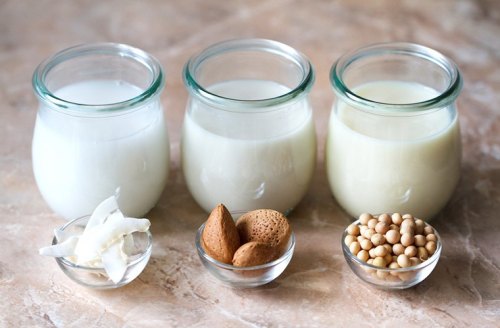Now that soy milk is on the outs with nutrition experts, we’re seeing a whole new wave of non-dairy options cropping up everywhere from Starbucks to Trader Joe’s. But when faced with the nearly impossible choice between hemp, cashew, coconut, and beyond, how do you know which one is going to meet all of your needs—nutritional and otherwise?
According to nutrition expert Nikki Ostrower, founder of new NYC health hub NAO Wellness, the first thing you should look for is how the milk has been processed. Like the rest of your grocery store picks, the fewer hard-to-pronounce ingredients in the carton, the better.
“The problem with boxed milks is, any time there’s a shelf-life associated with a product, a lot of preservatives have to be added to it—along with sweeteners and thickeners,” she explains. (Ostrower is a big proponent of DIY nut milks, but if that doesn’t fit into your meal prep schedule, she’s also a fan of Whole Foods’ own 365 brand.)
“Fresh is best,” adage aside, finding your perfect alt-milk match is mainly a matter of personal preference—they all have some pretty great benefits, and no one option trumps all the rest. Ahead, Ostrower breaks down the unique magic of the most popular dairy alternatives. Prepare to spend a little less time staring at the refrigerator case on your next grocery store run.
Keep reading for everything there is to know about the most popular alt-milks.

Most Versatile: Almond Milk
The most widely available nut milk is naturally teeming with good-for-ya vitamins and minerals, according to Ostrower. “Almonds are rich in vitamin E, calcium, phosphorous, iron, magnesium, zinc, selenium, copper, and B vitamins,” she says.
If you’re thinking that reads more like a multivitamin’s ingredients list, you’re not far off. Ostrower explains that this particular combination of nutrients can boost everything from your energy levels to immunity, brain function, and skin health. Ostrower also loves fresh almond milk for its versatility. She suggests adding a dash of Celtic sea salt to your glass for an electrolyte boost, or a scoop of collagen powder for a bit of added protein. Keep in mind, however, almond milk goes bad sooner than you may think. So, ensuring you use every last drop before it spoils is imperative.
Good for Your Gut: Cashew milk
Freshly made cashew milk is teeming with gut-friendly fiber, due to the fact that the cashews can be used whole (as opposed to straining out the nut solids, which is common practice for other alt-milks). Cashew milk is also unique in that it’s high in antioxidants, calcium, and magnesium, as well as bioflavinoids and phytochemicals.
So what does all this science speak actually mean? “Bioflavinoids can help to stop cancer cells from dividing,” explains Ostrower, “and the phytochemicals and antioxidants can protect us from heart disease and cancer.” Ostrower also calls out oleic acid, a monounsaturated (AKA, “healthy”) fat that raises good cholesterol and contributes to overall heart health.
Most Delicious: Macadamia Milk
Like cashews, macadamia nuts are rich in both flavinols and antioxidants, according to Ostrower. She also gushes about the fact that they make a delicious alt-milk due to their rich and creamy taste. Plus, DIY-ing macadamia nut milk is super easy. (Here’s how to do it.)
One thing to watch out for: Macadamia nuts are pretty pricey, so if you’re willing to shell out a little extra cash, go for it. Otherwise, cashew milk will more or less provide the same nutrients.
Post-Workout Powerhouse: Coconut Milk
You may have heard that coconut milk is super high in fat—and that’s correct! But that’s not a bad thing, since minimally-processed coconut milk also contains lauric acid. “Lauric acid is a medium-chain fatty acid used by the body as energy,” Ostrower says. “It helps your body use the fats in coconut milk as energy instead of storing them as body fat.” These fats also helps to make you feel fuller by regulating your blood sugar—Ostrower swears by coconut milk to stay energized all day long.
This alt-milk is also high in minerals and nutrients, most notably manganese, copper, phosphorus, magnesium, iron, and potassium. BRB, petitioning to classify coconut milk as a superfood.
Packed with Protein: Hemp Milk
According to Ostrower, the benefits to fresh hemp milk are seemingly endless. “Hemp seeds are high in omega-3 fatty acids, which are wonderful for heart health,” she says. Ostrower points out that hemp seeds also contain gamma linolenic acid, which contributes to muscle health and works alongside those omega-3s to fight inflammation. The seeds also contain all 22 amino acids, making it a perfect protein—and a great option for vegans.
And in case you were wondering, although hemp seeds include a minuscule, trace amount of THC—the psychoactive substance in cannabis—you won’t get any funky results on a drug test from drinking hemp milk. (And no, its myriad wellness perks aren’t a hallucination either.)
PSA: Yogurt is now getting the non-dairy treatment, too. (Here’s what you need to know.) And if you’re a die-hard cow’s milk fan, a growing number of health pros suggest going full-fat.
Sign Up for Our Daily Newsletter
Get all the latest in wellness, trends, food, fitness, beauty, and more delivered right to your inbox.
Got it, you've been added to our email list.














